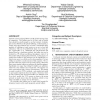Free Online Productivity Tools
i2Speak
i2Symbol
i2OCR
iTex2Img
iWeb2Print
iWeb2Shot
i2Type
iPdf2Split
iPdf2Merge
i2Bopomofo
i2Arabic
i2Style
i2Image
i2PDF
iLatex2Rtf
Sci2ools
CCR
2005
2005
Part III: routers with very small buffers
Internet routers require buffers to hold packets during times of congestion. The buffers need to be fast, and so ideally they should be small enough to use fast memory technologies such as SRAM or all-optical buffering. Unfortunately, a widely used rule-of-thumb says we need a bandwidth-delay product of buffering at each router so as not to lose link utilization. This can be prohibitively large. In a recent paper, Appenzeller et al. challenged this rule-of-thumb and showed that for a backbone network, the buffer size can be divided by N without sacrificing throughput, where N is the number of flows sharing the bottleneck. In this paper, we explore how buffers in the backbone can be significantly reduced even more, to as little as a few dozen packets, if we are willing to sacrifice a small amount of link capacity. We argue that if the TCP sources are not overly bursty, then fewer than twenty packet buffers are sufficient for high throughput. Specifically, we argue that O(log W) buffer...
CCR 2005 | Routers | Small | TCP Sources |
Related Content
| Added | 15 Dec 2010 |
| Updated | 15 Dec 2010 |
| Type | Journal |
| Year | 2005 |
| Where | CCR |
| Authors | Mihaela Enachescu, Yashar Ganjali, Ashish Goel, Nick McKeown, Tim Roughgarden |
Comments (0)

